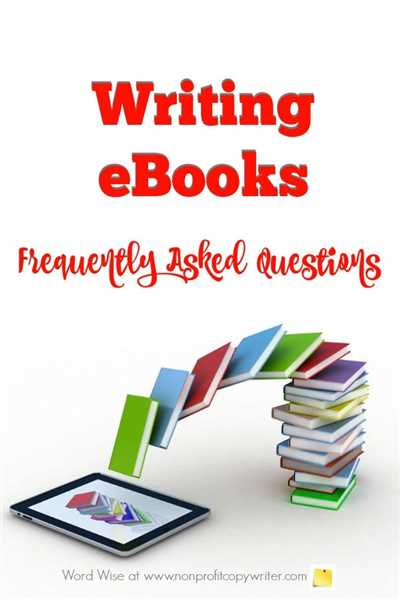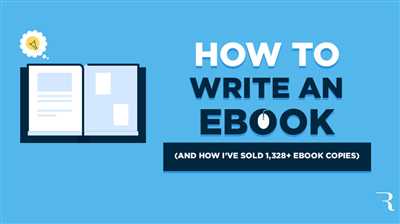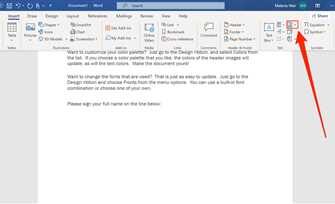
If you’re a small business owner looking to expand your online presence, writing an ebook can be a valuable tool. It not only helps to establish your company’s expertise in a particular topic, but it also serves as a great lead magnet to attract potential customers. Whether you’re struggling with what topic to choose or simply want to learn more about the ebook writing process, this guide will give you all the tips and tricks you need to write a successful ebook.
First and foremost, it’s important to define the goal of your ebook. Are you writing it to generate more sales for your products or services? Or maybe you want to use it as a tool to educate your audience and build trust. Knowing your goal will help you stay focused throughout the writing process and ensure that your ebook provides value to your target audience.
Once you have a clear idea of your ebook’s goal, you should start by researching your topic. Look for online resources, books, and articles that can help you gather information and get a better understanding of the subject matter. It’s also a good idea to review existing ebooks on the same topic to see what’s already out there and find ways to make your ebook unique.
When it comes to writing your ebook, there are a few key tips to keep in mind. First, choose a writing style that suits your audience and topic. If you’re writing a guide on how to care for indoor plants, for example, you’ll want to use a friendly and conversational tone. On the other hand, if you’re writing a piece on the benefits of AI in business, a more formal and informative style might be appropriate.
Another important tip is to keep your content organized and easy to follow. Break your ebook into chapters or sections and use subheadings to clearly outline the main points. This not only helps the reader navigate through the content but also makes it easier for you to write and stay on track.
As a writer, it’s important to keep your ebook concise and to the point. While it’s tempting to include every detail and piece of information you have, remember that your reader is looking for a quick and easy read. Summarization helps to distill your message into its essence, making it more valuable to the reader.
Finally, don’t forget to proofread and edit your ebook before publishing. Typos and grammar mistakes can be a major turnoff for readers, so take the time to review your work or consider hiring a professional editor. A polished and error-free ebook will leave a lasting impression on your audience and increase the chances of them recommending it to others.
In conclusion, writing an ebook is a valuable tool for any company looking to establish its expertise, attract customers, and generate more sales. By following the tips outlined here, you can create a high-quality ebook that not only helps your business but also provides value to your readers. So, what are you waiting for? Start writing your ebook today and reap the benefits of this powerful marketing tool!
- How to Write an Ebook for Your Business
- What Is An eBook
- Choose your topic
- Review the company’s style guide AI summarization
- How AI can help
- Keep on reading
- 3 tips to get more sales/downloads for your digital products
- Digital vs Physical products: Which should you sell online?
- Video:
- How to Create Your EBOOK in Less Than 48 HOURS!
How to Write an Ebook for Your Business
If you want to create an ebook for your business, there are several steps you should follow to ensure its success. Ebooks have become a popular way for companies to provide valuable content to their target audience. Whether you want to sell your ebook or offer it for free, it can be a powerful tool for generating leads and driving sales. Here’s a step-by-step guide on how to write an ebook that will help you achieve your goals.
Step 1: Choose the Right Topic
The first step in writing an ebook is to choose a topic that is relevant to your business and appeals to your target audience. Consider the problems or challenges that your customers may be struggling with and choose a topic that provides a solution or valuable information. Make sure the topic is specific enough to be helpful, but broad enough to cover all the necessary details.
Step 2: Research and Outline the Content
Once you have chosen a topic, it’s time to conduct research and gather information. Look for credible sources and gather all the necessary data that supports your main points. Use your research to create an outline for your ebook, organizing the content into chapters or sections. This will help you stay organized and ensure that the information flows logically.
Step 3: Write Engaging Content
When it comes to writing your ebook, keeping the reader engaged is key. Write in a conversational style that is easy to understand and avoid using jargon or technical terms that your audience may not be familiar with. Break up the content into shorter paragraphs and use headings, subheadings, and bullet points to make it more scannable and reader-friendly.
Step 4: Edit and Proofread
After you have finished writing the content, it’s important to edit and proofread your ebook. Check for grammatical errors, typos, and ensure that the content flows smoothly. Consider hiring a professional editor or use online tools like Grammarly to help with the editing process.
Step 5: Design and Format
The visual appeal of your ebook is just as important as the content itself. Create an eye-catching cover design that grabs attention and conveys the topic of your ebook. Format the text in a way that is easy to read on both digital and physical devices. Use images, charts, graphs, or any other visual elements that support the content and make it more visually appealing.
Step 6: Create a Call to Action
At the end of your ebook, provide a clear call to action for your readers. This could be signing up for your newsletter, downloading a free resource, or purchasing a product or service. Make sure the call to action aligns with your overall goal for the ebook and provides value to the reader.
Writing an ebook for your business can be a powerful marketing tool that helps to establish your company’s expertise, provides value to your target audience, and generates leads and sales. By following the steps outlined above, you’ll be well on your way to creating a successful ebook that will benefit your business.
What Is An eBook
An eBook is a digital book that can be read on electronic devices such as computers, tablets, or e-readers. Unlike traditional physical books, an eBook is a digital file that can be downloaded or accessed online. It is a convenient and portable way to read books, as it allows readers to carry a large number of books in one device.
When writing an eBook, it is important to consider the reader’s needs and preferences. Here’s a guide that can help you write an eBook that will be more appealing to your target audience:
1. Choose a topic: Choose a topic that you are knowledgeable and passionate about. It should be something that will interest your target audience and provide value to them.
2. Follow a structure: Plan the structure of your eBook before you start writing. This will help you organize your thoughts and ensure a logical flow of information.
3. Write for your reader: Keep your reader in mind while writing. Use a conversational style and avoid using jargon or complex language. Make it easy to read and understand.
4. Provide valuable content: Make sure your eBook provides valuable information or solves a problem for the reader. This will give them a reason to read and recommend your eBook to others.
5. Use visuals: Include relevant images, graphs, or charts to make your eBook more visually appealing and engaging. This will help break up the text and provide visual support to the content.
6. Offer a free download: Offer a free download of your eBook to attract more readers. This can help increase your readership and promote your eBook.
7. Review and edit: Before publishing your eBook, make sure to review and edit it for any errors or inconsistencies. This will help improve the overall quality of your eBook.
8. Sell your eBook: If you have a small business or company, you can sell your eBook to generate sales and revenue. Use online platforms and marketing strategies to promote and sell your eBook.
9. Provide customer support: Offer customer support or assistance to your readers. This can help build a good relationship with your readers and encourage them to give positive reviews or referrals.
10. Learn from feedback: Pay attention to feedback from your readers and learn from it. This will help you improve your writing skills and create better eBooks in the future.
In summary, an eBook is a digital book that can be read on electronic devices. Writing an eBook involves choosing a topic, following a structure, writing for the reader, providing valuable content, using visuals, offering a free download, reviewing and editing, selling the eBook, providing customer support, and learning from feedback. Follow these tips to create an eBook that will be both enjoyable and helpful for your target audience.
Choose your topic
When it comes to writing an ebook, choosing the right topic is crucial. Your topic should be something that you are knowledgeable and passionate about. It should also be something that your target audience is interested in. Here are a few tips to help you choose the perfect topic:
- Know your audience: Before you decide on a topic, consider who your target audience is. Think about their interests, needs, and preferences. By understanding your audience, you can select a topic that will resonate with them.
- Referencing your business: If you have a small business, you can choose a topic that aligns with your company’s products or services. This can help you attract potential customers and establish your expertise in your industry.
- Learn from ebooks that sell: Look at the ebooks that are currently popular and successful. Analyze their topics, writing style, and content. This can give you ideas and insights into what works well and what doesn’t.
- Choose a unique angle: While it’s important to choose a topic that is popular, it’s crucial to give it a unique twist. Find a specific angle or niche within a broader topic that hasn’t been extensively covered. This can help your ebook stand out from the competition.
- Consider digital vs physical downloads: Decide whether you want to offer your ebook as a digital download or a physical product. Each format has its pros and cons, so weigh them carefully based on your goals and resources.
- Follow your passions: Writing an ebook takes time and effort, so choose a topic that you are passionate about. This will make the writing process more enjoyable and help you stay motivated throughout.
- Keep your goal in mind: Define what you want to achieve with your ebook. Is it to educate your audience, generate leads for your business, or make sales? Knowing your goal will help you narrow down your topic and shape your content accordingly.
Remember, there’s no one-size-fits-all approach when it comes to choosing a topic for your ebook. Follow these tips, trust your instincts, and pick a topic that excites you and resonates with your audience. Happy writing!
Review the company’s style guide AI summarization
When writing an ebook, it is important to follow the style guide provided by your company. This guide will outline the specific rules and guidelines that you should adhere to when writing content for the company’s ebooks. Reviewing and understanding the style guide is crucial in order to produce high-quality and consistent writing that meets the company’s standards.
One aspect of the style guide that you should pay attention to is AI summarization. AI summarization is the use of artificial intelligence technology to condense and summarize content. It can be a useful tool for writers, especially when they are struggling to condense complex ideas into a more concise format.
When using AI summarization, keep in mind that it should not replace the writer’s role in creating engaging and informative content. Rather, it should be used as a tool to enhance the writing process. By using AI summarization, writers can save time and effort in summarizing large amounts of information and focus on the more important aspects of the content.
There are many AI summarization tools available online that you can choose from. Some of these tools are free, while others require a small fee or offer a limited number of free downloads. Depending on your needs and budget, you can choose the tool that best fits your requirements.
Why should you use AI summarization in your ebooks? The main goal of an ebook is to provide valuable information to the reader in a concise and understandable manner. AI summarization helps achieve this goal by condensing lengthy content into shorter, more digestible pieces.
Additionally, using AI summarization can help target your content to specific customer segments. By summarizing complex topics into easy-to-understand language, you can reach a wider audience and increase the chances of sales for your ebook.
However, it is important to keep in mind that AI summarization is not suitable for every topic. Certain subjects, such as highly technical or scientific topics, may require more detailed explanations that AI summarization may not be able to provide effectively.
So, when reviewing your company’s style guide, make sure to consider AI summarization as a valuable tool in your writing process. It can help you write more efficiently and effectively, while still maintaining the integrity and quality of your content.
| Pros of AI summarization in ebook writing | Cons of AI summarization in ebook writing |
| 1. Saves time and effort in summarizing large amounts of information. | 1. Not suitable for every topic, especially highly technical or scientific subjects. |
| 2. Helps reach a wider audience and increase sales. | 2. May not provide the level of detail required for certain topics. |
| 3. Condenses complex ideas into shorter, more digestible pieces. | 3. Should not replace the writer’s role in creating engaging and informative content. |
In conclusion, reviewing the company’s style guide is crucial in ebook writing. AI summarization is a helpful tool that can assist writers in condensing and summarizing content, but it should not replace the writer’s role. By utilizing AI summarization effectively, you can produce high-quality ebooks that resonate with your target audience and drive sales for your business.
How AI can help

In today’s digital age, writing an ebook is a popular way for writers to share their knowledge and expertise on a specific topic. However, the process of writing and creating an ebook can be time-consuming and challenging, especially for those who are new to the world of self-publishing. This is where AI can be a valuable tool to help writers achieve their goal of creating a successful ebook.
AI, or Artificial Intelligence, is revolutionizing many industries, and the world of writing is no exception. With AI, writers have access to advanced tools and technologies that can assist them at every stage of their ebook creation process.
So, how exactly can AI help you as a writer? Here’s a guide to some of the ways AI can assist you in writing your ebook:
1. Idea generation and topic selection: AI can analyze data from online sources, such as trending topics and customer reviews, to help you choose a topic for your ebook that is in high demand and likely to sell well. AI can also help you generate new ideas and provide suggestions based on your interests and target audience.
2. Content creation: Writing a whole ebook can be a daunting task, but AI-powered content generation tools can help you write faster and more efficiently. AI can assist you in drafting and editing your ebook by suggesting improvements, rephrasing sentences, and enhancing the overall readability and flow of your content.
3. Summarization and referencing: AI can help you summarize complex information and condense it into digestible chunks. This not only helps you keep your ebook concise, but it also enables readers to quickly grasp the key points of your content. AI can also assist you in referencing credible sources, ensuring your ebook is well-researched and backed by reliable information.
4. Style and formatting: AI can analyze the writing style of popular authors and help you identify your own unique style. It can suggest improvements and provide guidelines to ensure consistency throughout your ebook. AI can also assist you in formatting your ebook for different devices and platforms, making it accessible to a wider audience.
5. Target audience analysis: AI can help you understand your target audience better by analyzing their preferences, behavior, and demographics. This valuable insight can help you tailor your ebook to meet their needs and expectations, ultimately leading to higher sales and customer satisfaction.
While AI can be a powerful tool for writers, it’s important to remember that it should be used as an aid rather than a replacement for human creativity and expertise. AI can assist you in various aspects of your ebook creation process, but it’s up to you as the writer to give it the final touch and ensure the content resonates with your readers.
Whether you’re an experienced writer or someone struggling to put your ideas into words, incorporating AI into your ebook creation process can definitely give you a competitive edge. So, why not embrace AI and leverage its power to create engaging and compelling ebooks that will capture the attention of your target audience?
Keep on reading
The first step is to choose a topic that you’re knowledgeable and passionate about. Writing an ebook is a major commitment, so you want to make sure it’s a topic you can write extensively on. Consider your target audience and what they would like to learn from your ebook. This will help you create valuable content that your reader will appreciate.
Once you have a topic in mind, it’s time to write. Some writers prefer to write the entire ebook in one go, while others break it down into smaller pieces. Find a writing style that works for you and stick to it. Remember to be concise and clear in your writing, as this will help your reader understand the information more easily.
If you’re finding it hard to write, you can also consider using AI tools to help you. There are AI-powered writing assistants that can provide suggestions and help improve your writing. They can even help with summarization and ensuring your content flows smoothly.
When writing your ebook, keep in mind that you’re not just writing for yourself. Your goal is to provide value to your readers. Make sure the content is well-structured, easy to follow, and offers practical tips or advice. You want your reader to walk away from your ebook feeling like they’ve learned something valuable.
After you’ve finished writing, it’s important to review and edit your ebook. Go through it multiple times to catch any typos, grammatical errors, or inconsistencies. If possible, have someone else read it and provide feedback. This will help ensure that your ebook is polished and professional.
Now that you have your ebook ready, it’s time to think about how you want to sell or distribute it. The online market offers various platforms where you can sell your ebook, such as Amazon Kindle Direct Publishing or Smashwords. You can also choose to give it away for free as a lead generation strategy for your business.
Remember, ebooks have many advantages over physical books. They’re easy to create, cost less to produce, and can be instantly downloaded by customers. Moreover, they allow you to showcase your expertise and build a relationship with your readers. So don’t let the idea of writing an ebook scare you away – it can definitely help your business in more ways than one!
To sum up, writing an ebook is a great way to share your knowledge and help your readers. By following these tips and keeping your customer’s needs in mind, you can create a successful ebook that provides value and drives sales for your company’s products or services. So keep on reading and start writing your ebook today!
3 tips to get more sales/downloads for your digital products
If you’re struggling to sell your digital products and want to get more sales or downloads, here are three tips that can help you achieve your goal:
- Choose the right topic for your digital product: When it comes to digital products like ebooks, content is key. You should choose a topic that is in demand and appeals to your target audience. Research the market to see what topics are popular and create an ebook around that. By choosing the right topic, you can attract more readers and increase your chances of getting more downloads and sales.
- Offer a free ebook or content: One way to entice customers to download or purchase your digital products is by offering a free ebook or content. This can be a small piece of your larger ebook or a completely separate guide. By giving away something of value for free, you can build trust with your audience and give them a taste of what they can expect from your paid products.
- Improve your writing style and content quality: The quality of your writing and content can make a big difference in attracting more sales and downloads. Make sure that your writing style is clear, engaging, and easy to read. Use proper grammar and punctuation to give a professional impression. Additionally, ensure that your content is informative, well-researched, and valuable to your readers. If your digital products provide helpful and high-quality information, the reader will be more likely to recommend and share them with others.
By following these three tips, you can increase the sales and downloads of your digital products. Remember to choose the right topic, offer free content, and focus on improving your writing style and content quality. With a well-targeted approach and high-quality digital products, you can attract more customers to your business and achieve greater success.
Digital vs Physical products: Which should you sell online?
When it comes to selling products online, one of the most popular options for many businesses is creating and selling ebooks. Ebooks provide a convenient way for customers to access content instantly, without having to wait for a physical product to be shipped.
There are several advantages to selling digital products like ebooks. Firstly, they are much easier to create and distribute compared to physical products. With the help of AI technology, writing an ebook can be a breeze. AI can not only provide you with content ideas and writing tips, but it can also assist in summarization and review. This helps struggling writers to produce high-quality ebooks that are engaging for the reader.
Moreover, the costs involved in creating and selling ebooks are significantly lower when compared to physical products. You don’t have to worry about inventory, shipping, or storage. Ebooks can be easily downloaded by customers after purchase, resulting in less hassle for both the seller and the buyer.
Another advantage of selling ebooks online is the ability to target a global audience. When you sell physical products, you are limited by geographical constraints. However, with digital products, customers from all around the world can access and download your ebook. This opens up a whole new market for your business.
However, that’s not to say that physical products should be completely disregarded. There are instances where selling physical products may be more suitable, depending on your business goals and target audience. For example, if you are in the business of selling plants, customers may prefer to receive live plants rather than an ebook on plant care.
Additionally, physical products can provide a more tangible experience for the customer. Holding a physical book or product can feel more valuable to some people than reading a digital version on a screen. This is particularly true for certain niches where collectibles or limited-edition products are highly sought after.
Ultimately, the decision to sell digital or physical products online depends on your specific business needs and the preferences of your target customer. If you’re a writer looking to monetize your content and reach a broader audience, ebooks are definitely a great option. On the other hand, if you have a small business and want to offer a unique, hands-on experience, physical products might be the way to go.
Whatever you choose, it’s important to keep in mind that technology is constantly evolving, and customer preferences can change over time. It’s essential to stay updated with the latest trends and adapt your business accordingly.









